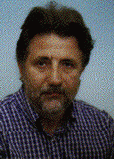- Einstein and the Mystery of Eternity of Life (2009) [Updated 8 years ago]
- The Vacuum as Ether in the last Century (2004) [Updated 1 decade ago]
- Ritardo Degli Orologi in Moto (Italian, Time Dilation for Moving Clocks) (2002) [Updated 1 decade ago]
- Some Almost Unknown Aspects of Special Relativity Theory (1997) [Updated 7 years ago]
- A Look at Frontiers of High energy Physics: From the GeV(109eV) to PeV(1015eV) and Beyond (1994) [Updated 1 decade ago]
- The Underwater Neutrino Telescopes (1993) [Updated 1 decade ago]
- Einstein and the Mystery of Eternity of Life (2009) [Updated 8 years ago]
While Special and General Relativity are well known by a very large number of people, Einstein's religious convictions are almost ignored. The paper focuses on his views about immortality. Einstein believed in Spinoza's view of God and in cosmic religion. Since the Special Relativity implies a kind of superdeterminism with the future completely determined, that can be taken as ontological proof for the non-Existence of a hypothetical God. Because of that K. Popper in a private conversation with him said: "You are Parmenides". Einstein's Pantheism was in contrast with the non-Euclidean universe of Special Relativity. In conclusion the interest in our times of his Weltanschaung will be taken in consideration. (see http://eprintweb.org/S/article/physics/0904.1280).
- The Vacuum as Ether in the last Century (2004) [Updated 1 decade ago]
In this paper we review the evolution of the concept of ?vacuum? according to different theories formulated in the last century, like Quantum Mechanics, Quantum Electrodynamics, Quantum Chromodynamics in Particle Physics and Cosmology. In all these theories a metastable vacuum state is considered which transforms from one state to another according to the energy taken into consideration. It is a ?fluid? made up by matter and radiation present in the whole Universe, which may be identified with a modern definition of ether.
- Ritardo Degli Orologi in Moto (Italian, Time Dilation for Moving Clocks) (2002) [Updated 1 decade ago]
- Some Almost Unknown Aspects of Special Relativity Theory (1997) [Updated 7 years ago]
T. Kuhn in his book The Structure of Scientific Revolutions, referring to the textbooks tradition says:
Characteristically, textbooks of science contain just a bit of history, either in an introductory chapter or often in scattered references to the great horoes of an earlier age. From such references both students and professionals come to feel like participants in a long-standing historical tradition. Yet the textbook-derived tradition in which scientists come to sense their participation is one that, in fact, never existed. For reasons that are both obvious and highly functional, science textbook (and too many of the older histories of science) refer only to that part of the work of past scientists that can easily be viewed as a contribution to the statement and solution of the text paradigm problems. Partly by selection and partly by distortion, the scientists of earlier ages are implicitly represented as having worked upon the same set of fixed problems and in accordance with the same set of fixed canons that the most recent revolution in scientific theory and method has made seem scientific. No wonder that textbooks and the historial tradition they imply have to be rewritten after each scienficic revolution. And no wonder that, as they are rewritten, science one again comes to seem largely cumulative.
In such an environment, education became a mere transmission of the orthodoxy and critical enquiry is eschewed. The aim of this paper is to draw the attention of our colleagues to some features of the Special Relativity theory which may enhance a critical enquiry.
- A Look at Frontiers of High energy Physics: From the GeV(109eV) to PeV(1015eV) and Beyond (1994) [Updated 1 decade ago]
The Olympia conference Frontiers of Fundamental Physics was a gathering of about a hundred scientists who carry on research in conceptually important areas of physical science (they do "fundamental physics"). Most of them were physicists, but also historians and philosphers of science were well represented. An important fraction of the participants could be considered "heretical" because they disagreed with the validity of one or several fundamental assumptions of modern physics. Common to all participants was an excellent scientific level coupled with a remarkable intellectula honesty: we are proud to present to the readers this certainly unique book.
Alternative ways of considering fundamental matters should of course be vitally important for the progress of science, unless one wanted to admit that physics at the end of the XXth century has already obtained the final truth, a very unlikely possibility even if one accepted the doubtful idea of the existence of a "final" truth. The merits of the Olympia conference should therefore not be judged a priori in a positive or in a negative way depending on one's refusal or acceptance, respectively, of basic principles of contemporary sience, but considered after reading the actual new proposals and evidence there presented. They seem very important to us... - From the Preface.
- The Underwater Neutrino Telescopes (1993) [Updated 1 decade ago]



